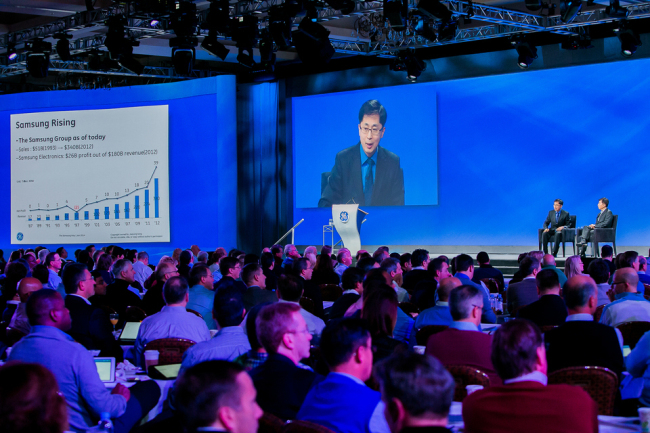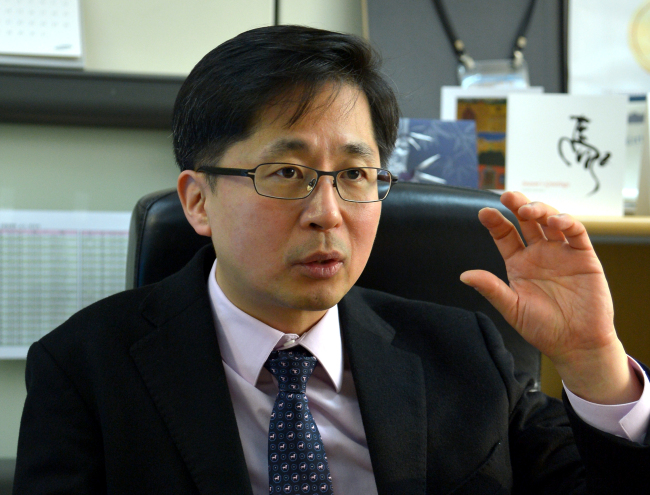GE turns to Samsung for success strategy
GE execs keen to learn Samsung’s recipe for success, according to author of ‘Samsung Way’
By Seo Jee-yeonPublished : Jan. 28, 2014 - 19:39

The management know-how of General Electric, a leading U.S. conglomerate, has long been considered a model for executives of Samsung Electronics.
The tables have turned, as GE now studies the success of the South Korean tech giant in areas such as mobile devices and semiconductors. In 2013, Samsung Electronics became the world’s top IT and electronics company in terms of sales and profitability to beat previous leaders such as Apple and HP.
Reflecting the changing tides, the GE management at its U.S. headquarters invited Song Jae-yong, a Korean professor, to its Global Leadership Meeting in Boca Raton, Florida, with more than 600 managers including GE chairman Jeffrey Immelt in attendance, to speak about Samsung’s road to success.
Song is well known in Asia for his book “Samsung Way,” based on an article he wrote for Harvard Business Review. He had access to many in the Samsung top brass for the book.
Last week, the author sat down with The Korea Herald to talk about the things he discussed with the GE staff and their attitude toward Samsung.
“It was a rather mind-blowing event. Everyone was paying great attention and asked questions about how Samsung transformed itself from a mediocre OEM manufacturer to a world-class performer in just 20 years,” said Song, a professor at Seoul National University Business School.

Song’s lecture took place 12 years after Samsung’s heir apparent Lee Jay-yong took an executive development course at GE’s John F. Welch Leadership Development Center, designed for nurturing global leaders.
“GE members were especially drawn to how Samsung is constantly in pursuit of paradoxical goals, such as creating innovation while remaining efficient, working on both economies of scale and speed, and last but not least, becoming as global as possible without losing its local consumer base,” the professor said.
“Combining the Korean spirit of ‘ppalli ppalli (hurry and rush)’ with Samsung’s tendency to mix in anything that’s deemed to be beneficial for the company has resulted in the unique but universal Samsung management stye.”
Having a family operate the business was another reason why Samsung was able to make speedy decisions that helped save precious time.
A constant sense of crisis ― reflected every time chairman Lee Kun-hee speaks out ― is also what fanned the stellar business performance Samsung has shown so far, not to mention its innovations and the passion it has managed to instill in its employees.
Another of Song’s theories on Samsung’s success is based on the “bibimbap (rice mixed with various vegetables)” culture.
By mixing together the necessary elements from Japanese- and American-style management, Samsung was able to create synergy between the two to form a strategy that’s both efficient and effective, he said.
“I don’t think such paradoxical management is limited to Samsung. There are many corporations have pulled this off,” the professor added.
It’s time now for the companies of more advanced countries to sit up and really learn from Samsung’s success, claimed Song.
“Samsung actively benchmarked global leaders such as GE and Toyota and modified those benchmarked practices to make them more appropriate for its unique culture through trial-and-error learning and experimentation. I think it is time others do that, too.”
By Bae Ji-sook (baejisook@heraldcorp.com)











![[Today’s K-pop] BTS pop-up event to come to Seoul](http://res.heraldm.com/phpwas/restmb_idxmake.php?idx=644&simg=/content/image/2024/04/17/20240417050734_0.jpg&u=)




![[KH Explains] Hyundai's full hybrid edge to pay off amid slow transition to pure EVs](http://res.heraldm.com/phpwas/restmb_idxmake.php?idx=652&simg=/content/image/2024/04/18/20240418050645_0.jpg&u=20240418181020)

![[Today’s K-pop] Zico drops snippet of collaboration with Jennie](http://res.heraldm.com/phpwas/restmb_idxmake.php?idx=642&simg=/content/image/2024/04/18/20240418050702_0.jpg&u=)